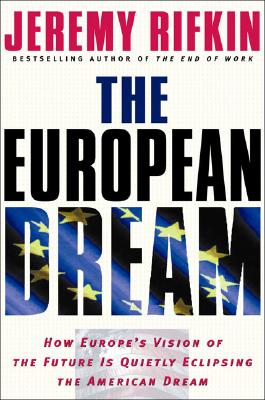

| THE EUROPEAN DREAM How Europe's Vision of the Future Is Quietly Eclipsing the American Dream Jeremy Rifkin New York: Jeremy P. Tarcher/Penguin, 2004 |
Rating: 5.0 High |
|||
| ISBN 1-58542-345-9 | 434pp. | HC | $25.95 | |
I once heard it said that "The secret of freedom is the ability to move away from people you don't like." But in today's crowded world, troublesome neighbors cannot easily be moved away from — nor can the effects of the energy they use, the products they consume, or the wastes they generate.
These effects have all become global. This means, says Rifkin, that the American Dream — the old standard of rugged individualism, of the loner dependent on no one but himself, just won't cut it any longer. Now, Rifkin contends, it is the turn of the European Dream — espousing community involvement rather than individual isolation, global rather than purely local concerns, working to live and enjoy things rather than living to work and acquire things — in short, living in interdependent balance with the other creatures on this planet (including other homo sapiens) and respecting their rights, identities, cultures and environments.
Both dreams have their strengths and weaknesses. Europeans are often faulted by Americans for not taking greater personal responsibility for their own destinies. Americans, on the other hand, are often criticized by Europeans for being heartless and not taking proper responsibility for their fellow human beings. Curiously, Europeans are beginning to heed the American advice by instituting reforms that draw more of a balance between individual initiative and collective responsibility, but there is little evidence that America is altering its dream by incorporating into it a greater sense of shared responsibility for the collective well-being of society. If anything, the American Dream is going the other way, becoming almost a caricature of the rugged individualism so glorified in America's frontier mythology. The result is that some Americans are getting richer while many Americans are getting poorer. In both instances, the American Dream suffers. The sons and daughters of wealthier Americans grow up in the lap of luxury and come to feel empowered and entitled to happiness and less willing to work hard, sacrifice and make something of themselves. For them, the American Dream becomes endless momentary pleasure-seeking, devoid of any grand purpose in life. For those Americans who still believe in the American promise, and who have made every effort to "pick themselves up by their own bootstraps" and succeed, only to be pulled down over and over again by a market economy and society weighted against them, the American Dream has come to feel like a cruel hoax, a myth without any real substance. For those on the top and for those on the bottom, the American Dream is losing its cachet and, in the process, casting the American people adrift. With only our religious fervor to hold on to, we have become a "chosen people" without a narrative—making America potentially a more dangerous and lonely place to be As long as our religious fervor was wed to personal success, the idea of a chosen people helped foster upward mobility and the democratic spirit in America. Now that the American Dream of personal success is taken for granted, trivialized, or, worse yet, become the object of ennui among a growing number of younger well-to-do Americans, all that's left is the idea of a chosen people. The question then becomes, Chosen for what? Religious fervor in search of a mission, especially when arched with the idea of enjoying a special status in the eyes of God, could metamorphose in threatening ways that we Americans are unaccustomed to thinking about. Already, we've seen in the post-September 11 era a hint of the possibilities, as a growing number of American Evangelical religious leaders, conservative politicians, and intellectuals talk of the coming global showdown between the civilized Christian West and the barbarian Muslim world. To be sure, most Americans of faith don't hold such views, at least not yet. And many other more secular Americans are far removed from any such thoughts. Another 9/11 could change all of that in an instant. – pages 57-58 |
I say! Pip Pip!
Getting everyone to speak and read the new vernacular necessitated the creation of a national educational system in each country. A single educational system, in turn, created reliable and predictable standards of what was to be learned and how. (And how!) Standardized national education was a wholly new phenomenon of the modern era and helped forge a national consciousness. With each generation of schoolchildren learning the same subjects, in the same way, in a common language, it wasn't long before peopel began to believe that they were, indeed, part of a shared experience and a common destiny. . . . There were often more subtle effects of national education besides creating a shared language and a sense of common cultural identity. State-administered public education inculcated students into the new spatial and temporal consciousness of the modern era. Schools were designed to resemble factories, and students were made comfortable with the idea of spending the entire day in a large, centralized facility with different rooms set aside for specialized learning tasks, mirroring the kind of specialization of labor and work environments they would graduate into after their education was completed. Students were also taught the virtues of punctuality and efficiency, making and keeping schedules, and being industrious, disciplined, and competitive with one another. They were made to believe that learning was an acquisitive activity, the goal being to possess knowledge that could be used to advance one's self-interest. The curriculum was designed to prepare students for the economic tasks that awaited them in the emerging market economy. Turning out "productive citizens" became the primary responsibility of national education in every modern state. – page 169 |

 To contact Chris Winter, send email to this address.
To contact Chris Winter, send email to this address.